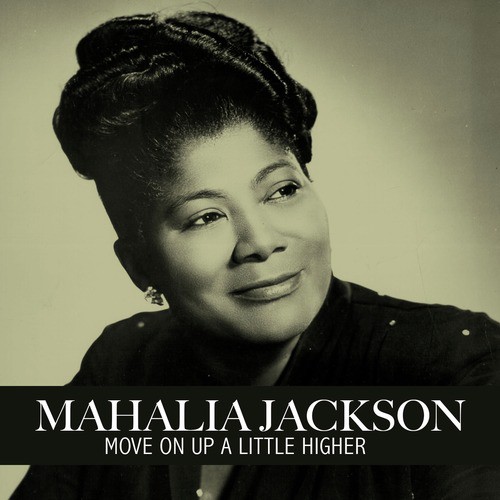 | Move on Up a Little HigherMahalia Jackson |
Writer(s): Rev. William Herbert Brewster (see lyrics here) First Charted: January 24, 1948 Peak: 21 US (Click for codes to charts.) Sales (in millions): 1.0 US, -- UK, 8.0 world (includes US + UK) Airplay/Streaming (in millions): -- radio, -- video, 1.93 streaming |
Awards:Click on award for more details. |
About the Song:The Reverend William Herbert Brewster composed “Move on Up” almost as a sermon in which he built up the imagery of a “Christian climbing the ladder to heaven.” WK It was originally intended for one of his religious pageants or passion plays. WK However, the song also had a strong undercurrent about civil rights for “black Americans’ gradual ascent to economic and social power.” TM The reverend acknowledged that “There were things that were almost dangerous to say, but you could sing it.” TM When it came to singing it, the task was put to Mahalia Jackson, “The Queen of Gospel.” She was born in New Orleans in 1911 and, at age 16, moved to Chicago where she joined a Baptist church choir. She also listened to blues recordings by Ma Rainey, Bessie Smith, and others. SS In 1929, she met Thomas A. Dorsey, a composer often heralded as “The Father of Gospel Music.” Over the next decade and a half, she toured singing his songs. While she gained a name for herself, it was after signing to Apollo in 1947 that she gained her greatest fame. In her hands, “Move on Up” transcended the boundaries of gospel music and thrust itself upon the secular world as well. The recording “transformed her career, and the history of gospel.” SS It found an audience with whites and blacks alike, making royalties of $300,000 in its first year of release, unheard of for a gospel song. SS It has reportedly become the best-selling gospel song to date. NRR The song starts out setting up “the story from earth to heaven” SS before relating “Mahalia’s meeting with all of the heroes of the Bible, as well as family members and friends.” SS Her singing was accompanied only by the standard church instruments of piano and organ, but her “delivery has the rhythm of preaching and the force of a lightning storm.” TM She blended “the vocal styles of blues singers, such as Bessie Smith and Ma Rainey, with the heartfelt emotion and commitment common to traditional gospel singing.” NRR Resources:
First posted 1/24/2012; last updated 3/31/2023. |








No comments:
Post a Comment